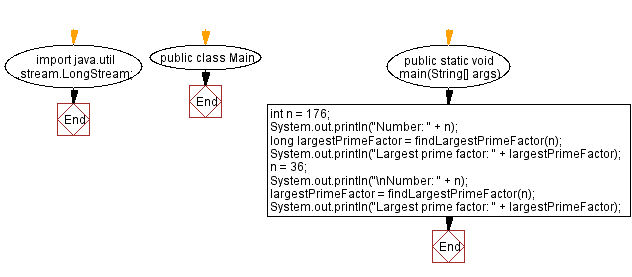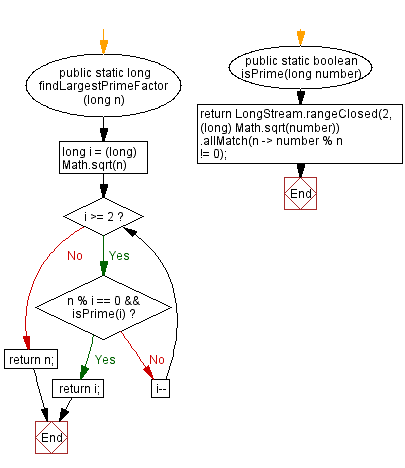Java Program: Lambda expression to find largest prime factor
24. Find largest prime factor using lambda
Write a Java program to implement a lambda expression to find the largest prime factor of a given number.
Sample Solution:
Java Code:
import java.util.stream.LongStream;
public class Main {
public static void main(String[] args) {
int n = 176;
System.out.println("Number: " + n);
long largestPrimeFactor = findLargestPrimeFactor(n);
System.out.println("Largest prime factor: " + largestPrimeFactor);
n = 36;
System.out.println("\nNumber: " + n);
largestPrimeFactor = findLargestPrimeFactor(n);
System.out.println("Largest prime factor: " + largestPrimeFactor);
}
public static long findLargestPrimeFactor(long n) {
for (long i = (long) Math.sqrt(n); i >= 2; i--) {
if (n % i == 0 && isPrime(i)) {
return i;
}
}
return n;
}
public static boolean isPrime(long number) {
return LongStream.rangeClosed(2, (long) Math.sqrt(number))
.allMatch(n -> number % n != 0);
}
}
Sample Output:
Number: 176 Largest prime factor: 11 Number: 36 Largest prime factor: 3
Explanation:
Main() method:
- Initializes a variable n with a value.
- Calls the findLargestPrimeFactor() method to calculate the largest prime factor of n.
- Prints the largest prime factor.
findLargestPrimeFactor(long n) method :
- It takes a long integer n as input.
- It iterates from the square root of n (converted to a long) downwards to 2.
- Inside the loop, it checks if n is divisible by the current value of i and if i is a prime number by calling the isPrime method.
- If both conditions are satisfied, it returns i, which is the largest prime factor.
- If no prime factors are found, it returns the original number n.
isPrime(long number):
- It takes a long integer number as input.
- It uses a LongStream to generate a range of numbers from 2 to the square root of number, inclusive.
- It checks if all numbers in the range satisfy the condition that number is not divisible evenly by any of them.
- If all numbers in the range satisfy the condition, it returns true, indicating that number is a prime number.
- If any number in the range divides number evenly, it returns false.
Flowchart:


For more Practice: Solve these Related Problems:
- Write a Java program to implement a lambda expression that finds the largest prime factor of a number using stream reduction.
- Write a Java program to create a lambda that factors a number into primes and then extracts the maximum using a custom comparator.
- Write a Java program to implement a lambda expression that checks each divisor of a number for primality and selects the largest.
- Write a Java program to chain lambda expressions to generate factors of a number, filter for primes, and then find the maximum factor.
Go to:
Improve this sample solution and post your code through Disqus
PREV : Find average string length using lambda.
NEXT : Convert integer to binary using lambda.
Live Demo:
Java Code Editor:
What is the difficulty level of this exercise?
Test your Programming skills with w3resource's quiz.
